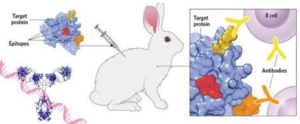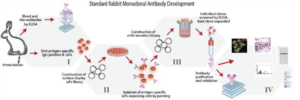Antibodies are otherwise known as immunoglobulin and are proteins that protect the body when an unwanted substance finds its way in. The unwanted substance or substances are antigens that antibodies fight once suspected in the body. Antibodies are produced by B cells and are located in various parts of the body.
What are monoclonal antibodies?
Monoclonal antibodies are those antibodies that are created in the lab that mimic the immune system’s natural ability to fight pathogens. Monoclonal antibodies can be created for mice, rats, hamsters, or rabbits. The type of monoclonal antibodies being considered is that which is developed in rabbits rather than mice and is most commonly used to generate antibodies.

https://images.app.goo.gl/YDqsE7qMapxX8Z5a9
Rabbit monoclonal antibodies are useful tools in carrying out developmental research. Rabbit customs monoclonal antibodies can be used in different applications such as immunofluorescence, immunohistochemistry, flow cytometry, western blot, and ELISA. Rabbit has been found to provide a better system for monoclonal antibody production because the immune system responds to a wider range of antigens. Rabbit antibody production offers a unique advantage over mice as it is capable of producing large varieties of B cells and antibody structures. The immune system of rabbits can also produce antibodies that have 10-100 times higher affinity for the target antigens.
Production of Rabbit monoclonal antibody
When compared, rabbit monoclonal antibodies have consistent similarity with mouse monoclonal antibodies while offering specificity and sensitivity. Rabbits are immunized having the resulting spleen cells fused with partner cells to make an immortal cell line expressing antibodies. These antibodies are derived from a single cell clone and characterized for performance in its application. The clone that comes out to be the best is then selected for the production of antibodies.
Why rabbit monoclonal antibodies are better.
The variable regions of immunoglobulin genes are influenced by somatic gene conversion and somatic hypermutation. And this happens more in rabbits than rodents, contributing to the enhancement of rabbit monoclonal antibody repertoire.
- The lgG isotype contained in rabbits is more than that of mice which has a higher ratio of lgM. And lgG has better specificity than lgM and this makes rabbits have more potential of developing specific antibodies.
- Complementarity-Determining Regions CDR3 sequences in Rabbit are longer and more heterogeneous and this leads to the occurrence of more sequences.
- There is lower immunodominance in rabbits’ immune systems than that of a mouse which allows for more antibody diversity.
- Rabbits have a larger number of spleens and other immune organs which shows the availability of more lymphocytes for producing antibodies than mice.
- Rabbits have extended periods of affinity maturation which can persist for long bringing about higher affinity and specificity for rabbit monoclonal antibodies.
Advantages of rabbit monoclonal antibodies

https://images.app.goo.gl/H9XQSYNfNhL8FEdBA
As a result of the unique features that the rabbit immune system has, the monoclonal antibody development in rabbits has the potential of providing some benefits to researchers.
High affinity and specificity: the monoclonal antibodies in rabbits are effective in recognizing minor epitope variations and cleaved versions of a target protein. Monoclonal antibodies of rabbits can also have extremely low equilibrium dissociation constants (KD) in the picomolar range (KD=10-12M)
Reduced background noise: monoclonal antibodies that are associated with rabbit has the capability of only detecting a single epitope with a low chance of cross-reacting with other proteins. Monoclonal antibodies of rabbits can bind to target antigens with greater affinity and this shows it to have a higher signal-to-noise ratio than other monoclonal antibodies.
Good for detecting post-translational modification (PTM): as a result of the unique immune system that is present in rabbits, they have the capacity of producing antibodies that are against small epitopes that exist in small molecules, lipids, and polymers and this can permit the monoclonal antibodies to detect the subtle changes in the post-translational modifications such as phosphorylation, methylation, acetylation, sumoylation, etc. or single amino acid substitutions.
Ideal for immunohistochemistry (IHC): monoclonal antibodies in rabbits have high sensitivity and low loss specificity and for IHC, antibodies need to be able to identify epitopes in the background with more noise. In an instance like this, rabbit monoclonal antibodies are the perfect choice as they can be highly sensitive in retaining specificity in applications that are as strict as immunohistochemistry.
Novel epitope recognition: there is a reduced immunodominance in rabbits’ immune systems with greater B-cells diversity than that of the mouse. This enables wider epitope detection with a higher possibility of detecting unique epitopes in the process of discovering rabbit monoclonal antibodies.
It validates Flow, IHC, WB, ICC, IF, and IP: rabbit monoclonal antibodies have validations for different applications use such as the IHC, WB, ICC, IF, IP, and Flow cytometry. It also applies to common species like humans, mice, and rats.
Cancer therapy: the rise in the use of monoclonal antibody development for cancer therapy was due to the first use of monoclonal antibody used for the prevention of acute organ rejection after transplantation. As rabbit monoclonal antibodies can provide alternative sources of therapy that are more specific and less expensive, it is being explored for therapeutic uses.
Conclusion
Custom rabbit monoclonal antibodies are in a wide range of use in various research, diagnostics, and clinical applications as a result of the immune system of rabbits being able to produce a higher affinity of antibodies than rodents. Monoclonal antibodies of rabbits also produce better reactions to immunogens having a higher affinity and specificity to the epitope. Using rabbits for monoclonal antibodies tends to be better at producing antibodies to smaller peptides with small size epitopes.
